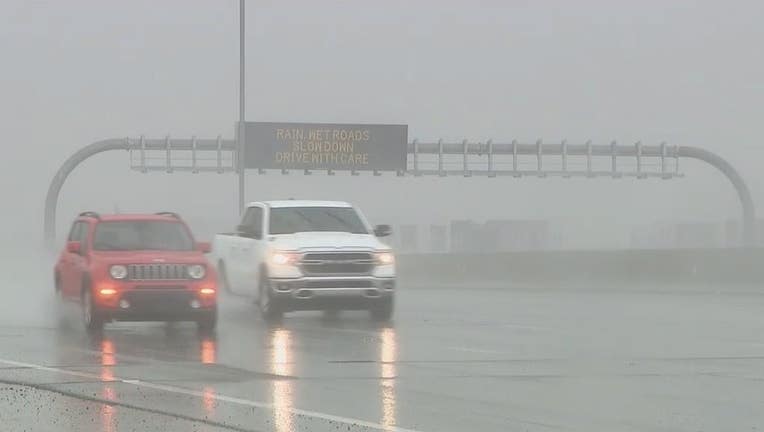5 monthly rainfall records set in July in northern Arizona

Arizona drivers in the rain (file)
FLAGSTAFF, Ariz. - An active monsoon season around northern Arizona in July brought five monthly rainfall records, officials said.
Last month, Show Low had 8.79 inches of rain although the city usually averages 2.35 inches in July, meteorologists with the National Weather Service in Flagstaff said.
The town of Payson had 6.98 inches of rainfall last month, exceeding its July average of 2.81 inches, officials said. St. Johns had 4 inches of rainfall last month compared to its usual July average of 1.41 inches.
Meteorologists also reported last month that Walnut Canyon National Monument had 8.67 inches of rainfall, topping its usual average of 2.55 inches for July. Meanwhile, Tuzigoot National Monument near Clarkdale had 6.14 inches of rainfall compared to its usual average of 1.64 inches.
Other cities in northern Arizona such as Page and Window Rock also had above-average rainfall last month but fell short of breaking any records.
Arizona Headlines
Featured
National Weather Service issues Excessive Heat Warning for Phoenix area and Southwestern Arizona
Weather officials say the Valley could see temperatures reach 113°F.
Featured
Hesitant family changes mind on COVID-19 vaccine after almost losing their son to the virus
The mother and father of a Valley teenager say they were hesitant about getting vaccinated against COVID-19 at first, but that all changed when their son almost died from the virus.
Featured
Arizona officials talk about $1.2T infrastructure package's potential benefits to Arizonans
Infrastructure deal could possibly go through if the bill is finalized at the Capital. FOX 10's Steve Nielsen reports.
Road Conditions
- Call 511 anywhere in Arizona or 1-888-411-ROAD (7623)
- az511.com
Driving in extreme temperatures
The Arizona Department of Transportation’s tips for driving in extreme temperatures include:
Have sun protection: In addition to an umbrella, take sunscreen and a wide-brimmed hat and wear loose-fitting, light-colored cotton clothing.
Fuel up: Keep your tank at three-quarters full. Running out of gas, especially in a remote location, is dangerous in extreme heat.
Hydrate: Take a cooler to keep extra drinking water cold, and consider adding several frozen bottles of water to use for cooling off or to thaw and drink if needed. Make sure everyone, including pets, stays hydrated.
Get help: If your vehicle breaks down in extreme heat, call for assistance right away to reduce wait time, and run the AC. If the AC isn’t working, roll down all windows.
Wait safely: If the temperature inside your vehicle becomes too hot, everyone, including pets, should exit carefully and seek out or create a shaded area as far away from the travel lanes as possible. Be careful walking on the road surface, which can be hot enough to burn skin. Keep your shoes on and try to keep your pets’ paws off the pavement. If you are stopped along the highway, raise the front hood and turn on hazard lights. Please keep in mind that parking in tall brush can start a fire.
Check your vehicle: You can help avoid breakdowns and blowouts by making sure your vehicle is in good operating condition. Check your air conditioner and coolant levels, top off any vital engine fluids and make sure your battery is up to par. Check your tire pressure, as the combination of under inflated tires and hot pavement can lead to a blowout.
MORE: https://azdot.gov/about/transportation-safety/severe-weather
Be prepared and stay safe during the monsoon
"Most Valley residents know how quickly and furiously storms can move in and out, bringing strong winds, dust, rain, and flash flooding. These storms can cause interruptions in services, such as water, power, and gas," stated Captain Ashley Losch of the Glendale Fire Department.
GFD reminds residents of ways they can be prepared and stay safe:
- Have flashlights with extra batteries on hand.
- Have food that can be prepared without the need for cooking or refrigeration.
- Have at least one gallon of clean water for each person in the household.
- Have backup power for anyone requiring power for a medical device.
- Have backup power for cell phones that do not require charging.
- Have a first aid kit ready and accessible.
- Never drive into areas with flowing water; it takes less than 10 inches to wash a car away.
- Avoid flooded areas, such as washes.
- If waters are rising, seek higher ground.
- Do not approach downed power lines, the ground can be energized for up to 200 feet.
- Keep pets indoors during storms.
Tune in to FOX 10 Phoenix for the latest news:
Get breaking news alerts in the FREE FOX 10 News app. Download for Apple iOS or Android.





